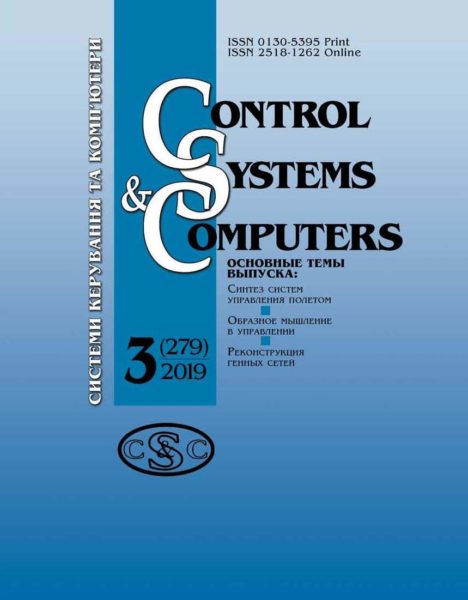Control Systems and Computers, N4, 2016, Article 3
DOI: https://doi.org/10.15407/usim.2016.04.027
Upr. sist. maš., 2016, Issue 4 (264), pp. 27-36.
UDC 330:652:519.2: 004.89
Bazan Lyudmila I., PhD in Econom. Science, Associate Professor, International Research and Training Centre of Information Technologies and Systems of the NAS and MES of Ukraine, Glushkov ave., 40, Kyiv, 03187, Ukraine, E-mail: bazmil@ukr.net
Conceptual Aspects of Intellectualization of Sustainable Growth Modeling of Transport and Logistics System Based on the Internet on Condition of Environment Uncertainty
Introduction. Problems of sustainable growth of transport and logistics system under conditions of uncertainty of external environment are considered. One of the most important aspects of this process is a management by process of disbanding and forming trains at rail yard. Significant fluctuations of environmental factors cause an adaptation of transport and logistics system to new conditions by changing operation of program, parameters and optimization criteria.
Purpose. A main task on appearance of abnormality in the formation and departure of train convoys is intellectualization of simulation of decision support processes, which is based on an information technology search of resource reserves via the Internet to ensure direction of the material flow sequence to the destination.
Results and Conclusion.Intellectual support of decision-making procedures is carried out on the Internet, which is related to the global address space of logistics centers. In order to implement the disbanding process and efficient forming of trains at rail yard the searching for free wagons via Internet is performed, which will ensure
timely dispatch the goods to the consumer and thus increase the level of profitability of transport and logistics system. One of possible approaches to the process of solving the problem of use of Internet intelligent resources on the basis of its monitoring, indexing and building a semantic web is proposed.
Intellectual support makes it possible: to reduce a level of uncertainty of environmental impact on the process of formation and disbanding of trains at rail yard; to reduce a complexity of evaluation of the situation and decision-making for sustainable development of transport and logistics system.
Keywords: transport and logistics system, intellectual resources, intelligent decision support, Internet.
- Abramov, A.A. 2002. Upravleniye ekspluatatsionnoy rabotoy. CH. 3. Tekhnicheskoye normirovaniye i operativnoye upravleniye. M.: RGOTUPS, 224 p. (In Russian).
- Myasnikova, L., 2010. “Intellektualizatsiya interneta i razvitiye setevoy logistiki”. Risk, 1, pp. 175–179. (In Russian).
- Tsvetkov, V.YA., 2011. “Intellektualizatsiya transportnoy logistiki”. Zheleznodorozhnyy transport, 4, pp. 38-40. (In Russian).
- V.I. Voronov, A.V. Voronov, V.A. Lazarev et. al., Mezhdunarodnyye aspekty logistiki. http://abc.vvsu.ru/ Books/mechdun_aspek_ logistic_up/default.asp (In Russian).
- Grytsenko, V.I., Bazhan, L.I., 2015. “Stsenarne doslidzhennya roz- vytku ekonomichnoyi systemy v umovakh nevyznachenosti na osnovi otsinky yiyi kryteriyiv efektyvnosti”. Ekonomiko-matematychne modelyuvannya sotsialʹno-ekonomichnykh system: Zb. nauk. prats. 20, K: Lohos, pp. 5–48. (In Ukrainian).
- Golenkov, V.V., Gulyakina, N.A., 2015. “Semanticheskaya tekhnologiya komponentnogo proyektirovaniya sistem, upravlyayemykh znaniyami”. Otkrytyye semanticheskiye tekhnologii proyektirovaniya intellektual’nykh sistem: Materialy V mezhdunar. nauch.-tekhn. konf. Minsk: BGUIR, pp. 57–78. (In Russian).
- Yu.A. Zagorul’ko, O.I. Borovikova, G.B. Zagorul’ko et. al., 2008. “Razrabotka portala znaniy po komp’yuternoy lingvistike”. Materialy XI nats. konf. po iskusstvennomu intellektu s mezhdunarodnym uchastiyem (KII–08) – Dubna, pp. 352–360. (In Russian).
- Skrebtsova, T.G., 2011. Kognitivnaya lingvistika: kurs lektsiy. SPb: SPbGU, 256 p. (In Russian).
- Timohty, J., 2009. Nokes. Mechanisms of knowledge. Thinking and reasoning, 15(1), pp. 1–37.
https://doi.org/10.1080/13546780802490186



